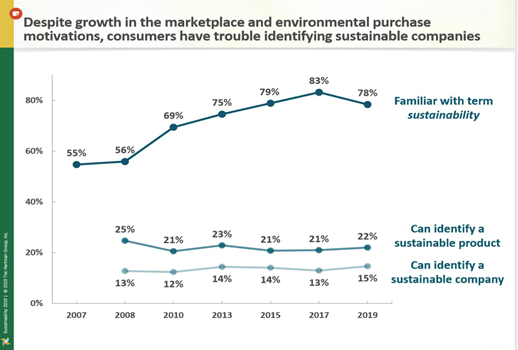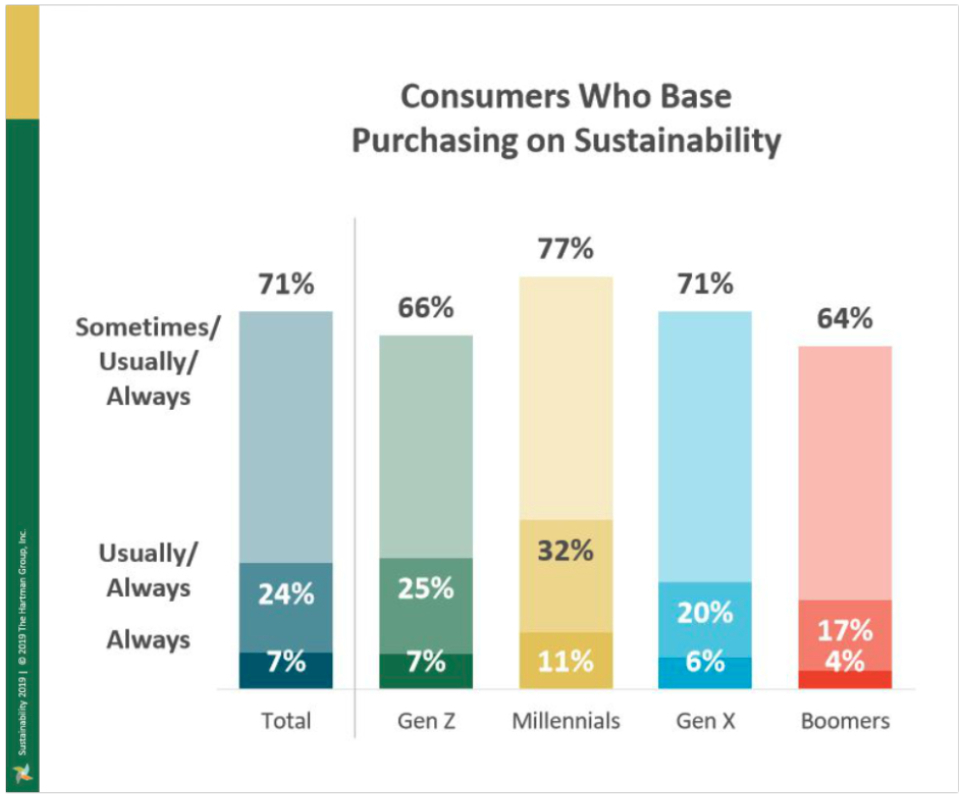Addressing the Knowledge Gap in Sustainability
Notably, while the use of plastic has soared, rising environmental consciousness has influenced the flexible packaging industry as product manufacturers adjust to align with Retailers and Corporate Social Responsibility. Shifts in consumer buying behavior has imposed pronounced restrictions as demand rises for more sustainable solutions across the board.1
In a 2019 study conducted by the Hartman group with respondents between the ages of 18 - 73, they found that 78% were familiar with the term ‘sustainability’, yet only 22% could identify a sustainable product, and 15% could name a sustainable company.2

This highlights a true gap between demand and action, as consumers are calling for products made using sustainable packaging materials without being able to correctly identify products which meet such demands. Results such as these are causing brand owners to struggle to find a cost effective solution without compromising the ability to serve fresh produce in categories such as shelf life and food waste.
“This knowledge gap places a very legitimate and costly pressure on converters, who are making sustainable business decisions by way of research and development projects in order to continually innovate solutions-based products. Even though we have expanded our flexible packaging offerings to increase recyclability and sustainable features, consumers are left with the difficulty of having to correctly identify products that make that environmental difference,”
Aaron Fox, Executive Vice President of Fox Packaging.
When the Hartman group asked what top three issues that companies should address, responses were:2
- 32% - Addressing air/water/soil pollution
- 29% - Decreasing single-use plastics
- 27% - Minimizing impact on climate change
- 27% - Switching to renewable energy
- 24% - Creating job with good pay/benefits
- 21% - Addressing plastic pollutions in the oceans
- 21% - Preventing labor abuse
Supply chains must review which of these issues are most applicable to their operations and implement sustainability initiatives that move them in a positive direction. For example, if a product is being packed in a bag that is single-use by most standards, begin by evaluating that packaging application and transition to a design that is both recyclable and reusable to demonstrate mindfulness around this cause.
Marketing channels should be leveraged to include consumers while sustainability plans are crafted and implemented.2 If companies thoughtfully tell their corporate social responsibility stories and how they are responding to these changing consumer behaviors, technology disruptors, and sustainability trends, the opportunities are magnified for high growth and improved profit margins in our fast-moving consumer goods segments1.

However, to succeed, companies need to embark on a change journey with controlled urgency. It is essential to first implement your packaging program strategy with continuous improvement-type actions and rely on market growth. Over time, increase strategic focus on innovation and agility in order to preserve value and capture long term growth.
Approaching your packaging as an eye-catching billboard for communication between your brand and consumers allows you to convey that your packaging meets essential product requirements and specific environmental objectives while highlighting your contribution toward responsible manufacturing and sustainable purchasing decisions.
With packaging’s ability to boost a product’s value and cost competitiveness, it is imperative that you partner with a supplier who is both economical, innovative, and invested in sustainable development, as fast moving consumer goods are vulnerable to increased retailer criteria and consumer demands especially in the critical scope of sustainability.
To connect with with a Fox Packaging representative or to further discuss a packaging solution for your brand, email info@foxbag.com.
2.https://www.supermarketperimeter.com/articles/4388-filling-the-sustainability-knowledge-gap; summary of The Hartman’s Group, Sustainability 2019: Beyond Business as Usual




